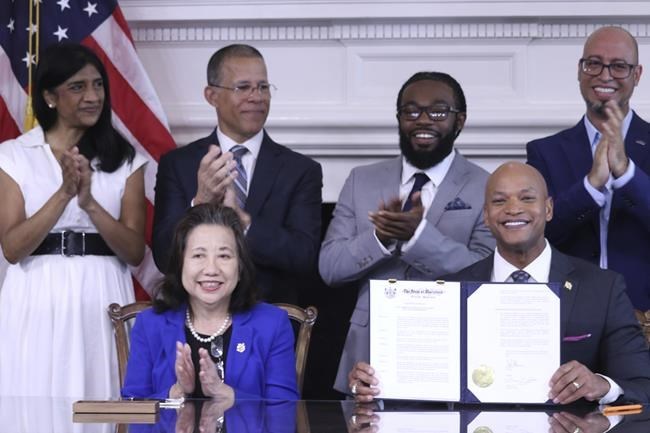
Maryland Gov. Wes Moore holds up an executive order he signed to issue more than 175,000 pardons for marijuana convictions on Monday, June 17, 2024 in Annapolis, Md. Maryland Secretary of State Susan Lee is seated left. Standing left to right are Lt. Gov. Aruna Miller, Maryland Attorney General Anthony Brown, Shiloh Jordan and Jason Ortiz, director of strategic initiatives for Last Prisoner Project. (AP Phopto/Brian Witte)
Republished June 17, 2024 - 10:50 AM
Original Publication Date June 16, 2024 - 11:36 PM
ANNAPOLIS, Md. (AP) — Maryland Gov. Wes Moore ordered more than 175,000 pardons for marijuana convictions on Monday, saying the “most sweeping state-level pardon in any state” will help reverse harms from the past caused by the war on drugs.
During a news conference, Moore said the executive order will affect “tens of thousands of Marylanders" convicted of misdemeanors. Some may have had more than one conviction pardoned through the process.
“We are taking actions that are intentional, that are sweeping and unapologetic, and this is the largest such action in our nation's history,” Moore, a Democrat, said.
Though the pardons will not result in anyone being released from incarceration — and nor will they result in having past convictions automatically expunged from a person's background check — advocates praised the move as a way of removing barriers to housing, employment, or educational opportunities based on convictions for conduct that is no longer illegal.
Heather Warnken, executive director of the University of Baltimore School of Law Center for Criminal Justice Reform. described the pardons as “a win for thousands of Marylanders getting a fresh start to pursue education, employment, and other forms of economic opportunity without the stain of a criminal conviction.”
Recreational cannabis was legalized in Maryland in 2023 after voters approved a constitutional amendment in 2022 with 67% of the vote. Maryland decriminalized possession of personal use amounts of cannabis on Jan. 1, 2023. Now, 24 states and the District of Columbia have legalized recreational cannabis.
“This is about changing how both government and society view those who have been walled off from opportunity because of broken and uneven policies,” Moore said.
Moore said “legalization does not turn back the clock on decades of harm that was caused by this war on drugs."
He continued: "It doesn’t erase the fact that Black Marylanders were three times more likely to be arrested for cannabis than white Marylanders before legalization. It doesn’t erase the fact that having a conviction on your record means a harder time with everything, everything, from housing, to employment to education.”
Shiloh Jordan, who lost his job on his second day at work after a minor cannabis conviction appeared in a background check by his employer, attended the news conference. Moore noted that even though Jordan went back to college and now works for the Center for Urban Families in Baltimore, he still had the cannabis conviction on his record.
“Well today, that ends," Moore said.
Jordan said he was thankful that his experience could be used as a testimony “and offer a lot of change for the people of Maryland.”
“It means a lot, because I know a lot of people that have been convicted for petty cannabis charges, and it really affected their whole way of life and their whole way of thinking,” Jordan said.
Maryland Attorney General Anthony Brown, who attended the news conference, said the action was “long overdue.”
“As a nation, we have taken far too long to correct the injustices of a system that is supposed to be just for all.”
The attorney general also noted the magnitude of the governor’s actions, and he said it was about equity.
“It’s about racial justice. While the order applies to all who meet its criteria the impact is a triumphant victory for African Americans and other Marylanders of color who were disproportionately arrested, convicted and sentenced for actions yesterday that are lawful today.”
More than 150,000 misdemeanor convictions for simple possession of cannabis will be affected by the order, which also will cover more than 18,000 misdemeanor convictions for use or possession with intent to use drug paraphernalia, according to a summary by the governor’s office.
Now that Moore has ordered the pardons, the Maryland Judiciary will ensure each individual electronic docket is updated with an entry indicating the conviction has been pardoned by the governor, a process that should take about two weeks, the governor's office said.
The governor's order also directs the state corrections department to develop a process to indicate a pardon in an individual’s criminal record, a process expected to take about 10 months to complete.
The pardons absolve people from the guilt of a criminal offense, and individuals do not need to take any action to receive the pardon.
A pardon is different from an expungement. Although the Judiciary will make a note on the record that the offense has been pardoned, it will still show on the record. Expungement is a process that lets a person ask the court to remove certain kinds of court and police records from public view.
News from © The Associated Press, 2024